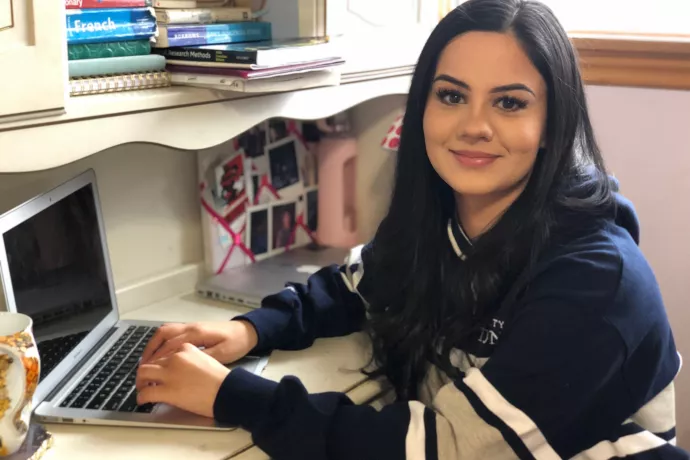
The Pandemic Papers: UTM students make history with donation to Mississauga archives
Students from U of T Mississauga are making history with the donation of first-person accounts of the global pandemic to Mississauga’s historical archives. The donation to Heritage Mississauga will provide a valuable resource for future historians.
In March, as the university closed the campus and transitioned to remote learning and teaching, historian and sessional instructor Dan Guadagnolo saw an opportunity to help his students parse the moment they were living through. Guadagnolo, who teaches a third-year course on visuality of fitness culture, challenged students to record how their lives were changing during the early weeks of the pandemic.
“I wanted the students to tell me about what their day-to-day life was like, and have them think about the pandemic in new ways,” says Guadagnolo. “I got a lot of interesting and very human stories about how students were navigating these extraordinary circumstances.”
The short essays provide deeply personal glimpses into the lives of students, their families and community life in Mississauga. Students write about new safety protocols at their part-time jobs, and the strangeness of moving through airports and grocery stores during the pandemic. Some worry about the health of family members working in essential services or living abroad. Others write about takeout meals, social media fitness trends and missing friends.
Guadagnolo was delighted by the range of topics. “I was expecting responses about people feeling overwhelmed, stressed out or scared,” he says. “But their stories were also funny, and discuss how living through big transformations can also be kind of boring.”
Guadagnolo reached out to Heritage Mississauga historian and UTM alumnus Matthew Wilkinson (BA, 2006), who saw a natural fit for the papers in the city’s historical record. The UTM papers will be kept in the Heritage Mississauga archives in both digital and physical formats to be used in future exhibitions. Scholars and community historians will also be able to turn to the primary source documents for clues about what life was like in the early days of the pandemic.
“We are not just record keepers and record consultants—we are record makers,” says Wilkinson. “With this donation, we are collecting resources as history is unfolding. These contributions offer the chance to see what everyday people see as the impact of this moment on their daily lives and in the community.”
Wilkinson, who has been reviewing documents from the 1918 Spanish influenza pandemic, notes that there’s a dearth of information about day-to-day life in the city’s archival record. “We have institutional responses, and newspaper reports, but we don’t have personal memories,” Wilkinson says.
The Heritage Mississauga team is also soliciting reflections from the wider Mississauga community about living through this moment in history, through social media and direct submissions.
Wilkinson points to community events, like a recent parade of postal trucks by a hospital to show support for frontline healthcare workers, the painted rocks and chalk messages springing up in neighbourhoods, and nightly banging of pots and pans to support health care workers. “These are neat stories about how everyday people are engaging with this time,” he says. “In the future, this will be an incredible record.”
“Memory fades,” Wilkinson continues. “At some point in time, people will want to look back at this moment and want to know how people coped. That’s why we want to record it now, and make sure we capture those primary reflections that gather this story as it is happening.”
Read a selection of student reflections about the pandemic:
- Third-year visual culture and communications student Adara LePage writes about adjusting to remote learning while in quarantine and the inability to escape pandemic news.
- Fourth-year Communication, Culture, Information & Technology (CCIT) student Kevin Carr writes about how new pandemic precautions have changed both student life and his part-time work at a grocery store. Despite concerns about his health, Carr remains optimistic about what the future holds.
- Kassandra Monterroso, a fourth-year double major in philosophy and art and art history, writes about noticing the creeping changes imposed on everyday transactions, and how she is occupying herself at home.
- Third-year CCIT student Jasleen Toor writes about her experiences in the early days of the pandemic, about missing her daily school commute and the difficulties of physical distancing in a household where both parents are essential service workers.
- Second-year CCIT student Sophia Smith writes about the surprise of seeing North Americans wear face masks, and about the strange journey across the border to reunite with her family in the United States.
- Graduating art and art history student Jay Gonzalez TInoco writes losing his retail job, worries about family living abroad, and is surprised to find that he really is a people person.
